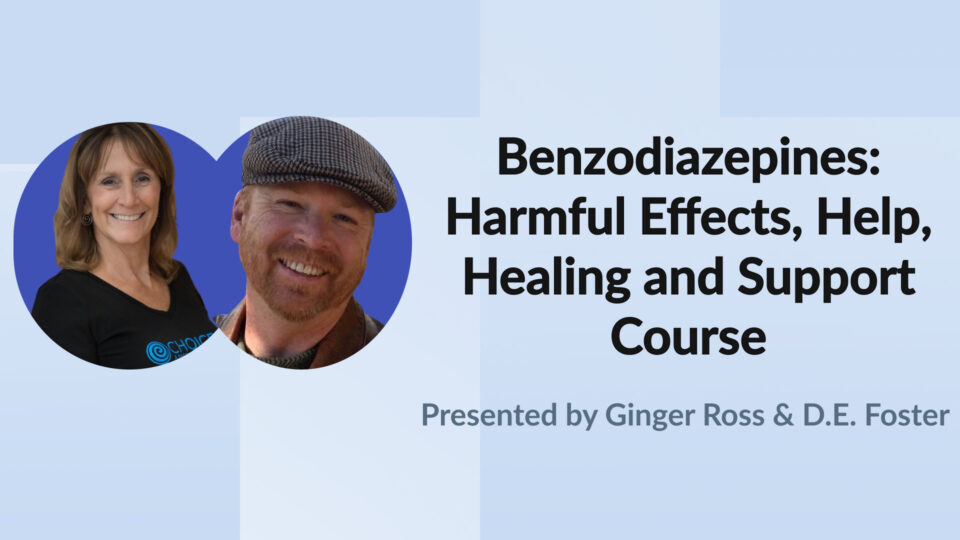Benzodiazepines: Harmful Effects, Help, Healing and Support

Benzodiazepines: Harmful Effects, Help, Healing and Support
3 Modules

Presented By
-
 D.E. FosterMore Info
D.E. FosterMore Info
Dates and Times
-
-Live Webinar
-
-Live Webinar
-
-Live Webinar
Location
-
Live WebinarAccess virtually on TPN.health
Benzodiazepines, often referred to as “benzos,” are a class of psychoactive drugs commonly prescribed for various health conditions such as anxiety, insomnia, and seizure disorders. While these medications can provide therapeutic benefits, they also come with a range of potential side effects and risks, including physical dependence and addiction. This three-day, 10-hour training is designed to equip individuals with the knowledge and skills needed to understand the effects of benzodiazepines taken as prescribed or illicitly, and support those who may be experiencing adverse effects from them. This course will provide you with cutting edge knowledge and tools to offer help reduce harm while providing informed assistance to those suffering from the effects of benzodiazepines. By the end of this course, participants will be better prepared to offer non-judgmental assistance to individuals taking prescription benzodiazepines (as prescribed or illicit use), withdrawing/tapering from benzodiazepines, and promote overall well-being within their communities. This training program combines interactive presentations, group discussions, case studies, and practical exercises to ensure that participants develop a comprehensive understanding of benzodiazepines and the ability to provide meaningful support for those affected by benzodiazepine use.
- • Counselors
- • Substance Use Disorder Professionals
- • Social Workers
- • Licensed Marriage and Family Therapists
-
Agarwal, S. D., & Landon, B. E. (2019). Patterns in Outpatient Benzodiazepine Prescribing in the United States. JAMA network open, 2(1), e187399. https://doi.org/10.1001/jamanetworkopen.2018.7399
-
Ashton H. (2005). The diagnosis and management of benzodiazepine dependence. Current opinion in psychiatry, 18(3), 249–255. https://doi.org/10.1097/01.yco.0000165594.60434.84
-
Barros, V. V., Opaleye, E. S., & Noto, A. R. (2018). Is the regulation of Z-drugs in Brazil in line with scientific research and international standards?. Revista brasileira de psiquiatria (Sao Paulo, Brazil : 1999), 40(1), 112. https://doi.org/10.1590/1516-4446-2017-2372
-
Cocker, F., & Joss, N. (2016). Compassion Fatigue among Healthcare, Emergency and Community Service Workers: A Systematic Review. International journal of environmental research and public health, 13(6), 618. https://doi.org/10.3390/ijerph13060618
-
Colorado Consortium for Prescription Drug Abuse Prevention. (2022). Benzodiazepine Deprescribing Guidance. https://corxconsortium.org/wp-content/uploads/Benzo-Deprescribing.pdf.
-
Dodds T. J. (2017). Prescribed Benzodiazepines and Suicide Risk: A Review of the Literature. The primary care companion for CNS disorders, 19(2), 10.4088/PCC.16r02037. https://doi.org/10.4088/PCC.16r02037
-
Fixsen, A. M., & Ridge, D. (2017). Stories of Hell and Healing: Internet Users' Construction of Benzodiazepine Distress and Withdrawal. Qualitative health research, 27(13), 2030–2041. https://doi.org/10.1177/1049732317728053
-
Foster DE. (2018). Benzo Free: The World of Anti-Anxiety Drugs and the Reality of Withdrawal. Denim Mountain Press.
-
Frederick, B. (2017). Recovery and renewal: Your essential guide to overcoming dependency and withdrawal from sleeping oills, other benzodiazepine tranquillisers, and anti-depressants. Jessica Kingsley Publishers.
-
Greenberg MI. (2001). Benzodiazepine withdrawal: Potentially fatal, commonly missed following benzodiazepine cessation, withdrawal symptoms may begin within 24 hours or take up to two weeks to develop. Emergency Medicine News. https://journals.lww.com/em-news/full-text/2001/12000/benzodiazepine_withdrawal_potentiallyfatal,.13.aspx.
-
Groshkova, T., Best, D., & White, W. (2013). The Assessment of Recovery Capital: properties and psychometrics of a measure of addiction recovery strengths. Drug and alcohol review, 32(2), 187–194. https://doi.org/10.1111/j.1465-3362.2012.00489.x
-
Gucciardi, E., Jean-Pierre, N., Karam, G., & Sidani, S. (2016). Designing and delivering facilitated storytelling interventions for chronic disease self-management: a scoping review. BMC health services research, 16, 249. https://doi.org/10.1186/s12913-016-1474-7
-
Hoffmann F. (2013). Benefits and risks of benzodiazepines and Z-drugs: comparison of perceptions of GPs and community pharmacists in Germany. German medical science : GMS e-journal, 11, Doc10. https://doi.org/10.3205/000178
-
Isacsson, G., Holmgren, P., Druid, H., & Bergman, U. (1999). Psychotropics and suicide prevention. Implications from toxicological screening of 5281 suicides in Sweden 1992-1994. The British journal of psychiatry : the journal of mental science, 174, 259–265. https://doi.org/10.1192/bjp.174.3.259
-
Lann, M. A., & Molina, D. K. (2009). A fatal case of benzodiazepine withdrawal. The American journal of forensic medicine and pathology, 30(2), 177–179. https://doi.org/10.1097/PAF.0b013e3181875aa0
-
Lugoboni, F., & Quaglio, G. (2014). Exploring the dark side of the moon: the treatment of benzodiazepine tolerance. British journal of clinical pharmacology, 77(2), 239–241. https://doi.org/10.1111/bcp.12148
-
National Institute on Drug Abuse. (2018) Principles of Drug Addiction Treatment: A Research-Based Guide (Third Edition). https://nida.nih.gov/download/675/principles-drug-addiction-treatment-research-based-guide-third-edition.pdf?v=74dad603627bab89b93193918330c223.
-
National Institute on Drug Abuse. (2018). Research suggests benzodiazepine use is high while use disorder rates are low. National Institute on Drug Abuse. Published October 18, 2018. Accessed June 26, 2022. https://nida.nih.gov/news-events/science-highlight/research-suggests-benzodiazepine-use-high-while-use-disorder-rates-are-low.
-
Olfson, M., King, M., & Schoenbaum, M. (2015). Benzodiazepine use in the United States. JAMA psychiatry, 72(2), 136–142. https://doi.org/10.1001/jamapsychiatry.2014.1763
-
Overton, S. L., & Medina, S. L. (2008). The stigma of mental illness. Journal of Counseling & Development, 86(2), 143–151. https://doi.org/10.1002/j.1556-6678.2008.tb00491.x
-
Ponte, M. L., Wachs, L., Wachs, A., & Serra, H. A. (2017). Prescribing cascade. A proposed new way to evaluate it. Prescripción en cascada. Una nueva propuesta para evaluarla. Medicina, 77(1), 13–16.
-
Prochaska, J. O., & DiClemente, C. C. (1986). Toward a comprehensive model of change. In W. R. Miller & N. Heather (Eds.), Treating addictive behaviors: Processes of change (pp. 3–27). Plenum Press. https://doi.org/10.1007/978-1-4613-2191-0_1
-
Reid Finlayson, A. J., Macoubrie, J., Huff, C., Foster, D. E., & Martin, P. R. (2022). Experiences with benzodiazepine use, tapering, and discontinuation: an Internet survey. Therapeutic advances in psychopharmacology, 12, 20451253221082386. https://doi.org/10.1177/20451253221082386
-
Reisfield, G. M., & Webster, L. R. (2013). Benzodiazepines in long-term opioid therapy. Pain medicine (Malden, Mass.), 14(10), 1441–1446. https://doi.org/10.1111/pme.12236
-
Salzman C. (1998). Addiction to benzodiazepines. The Psychiatric quarterly, 69(4), 251–261. https://doi.org/10.1023/a:1022125929946
-
Santo, L., Rui, P., & Ashman, J. J. (2020). Physician Office Visits at Which Benzodiazepines Were Prescribed: Findings From 2014-2016 National Ambulatory Medical Care Survey. National health statistics reports, (137), 1–16.
-
Warlick H.G., De Souza G.N., & Gallicchio, V.S. (2020). Restoration of gabaa receptor function after benzodiazepine use: A meta-analysis. Journal Of Stem Cell Research. 1(1):1-19. doi:10.52793/jscr.2020.1(1)-05 Witt-Doerring, Josef & Shorter, Daryl & Kosten, T.. (2018). Online communities for drug withdrawal: What can we learn?. Psychiatric Times. 35. 1-4+14.
TPN.health has been approved by NBCC as an Approved Continuing Education Provider, ACEP No. 7267. Programs that do not qualify for NBCC credit are clearly identified. TPN.health is solely responsible for all aspects of the programs.
Course meets the qualifications for hours of continuing education credit for LPCCs as required by the California Board of Behavioral Sciences. TPN.health is approved by the California Association of Marriage and Family Therapists to sponsor continuing education for LPCCs. TPN.health maintains responsibility for this program/course and its content.
Trusted Provider Network, LLC is recognized by the New York State Education Department’s State Board for Mental Health Practitioners as an approved provider of continuing education for licensed mental health counselors. #MHC-0220.
This course has been approved by TPN.health, as a NAADAC Approved Education Provider, for educational credits. NAADAC Provider #198061, TPN.health is responsible for all aspects of the programming. Counselor Skill Group: Legal, Ethical and Professional Development.
TPN.health, #1766, is approved to offer social work continuing education by the Association of Social Work Boards (ASWB) Approved Continuing Education (ACE) program. Organizations, not individual courses, are approved as ACE providers. State and provincial regulatory boards have the final authority to determine whether an individual course may be accepted for continuing education credit. TPN.health maintains responsibility for this course. ACE provider approval period: 03/31/2022 – 03/31/2025. Social workers completing this course receive 10 continuing education credits.
Course meets the qualifications for hours of continuing education credit for LCSWs as required by the California Board of Behavioral Sciences. TPN.health is approved by the California Association of Marriage and Family Therapists to sponsor continuing education for LCSWs. TPN.health maintains responsibility for this program/course and its content.
Trusted Provider Network, LLC is recognized by the New York State Education Department’s State Board for Social Work as an approved provider of continuing education for licensed social workers #SW-0654.
Course meets the qualifications for hours of continuing education credit for LCSWs as required by the California Board of Behavioral Sciences. TPN.health is approved by the California Association of Marriage and Family Therapists to sponsor continuing education for LMFTs. TPN.health maintains responsibility for this program/course and its content.
Trusted Provider Network, LLC is recognized by the New York State Education Department’s State Board for Mental Health Practitioners as an approved provider of continuing education for licensed marriage and family therapists #MFT-0097.
-
Laying the Foundation: A Basic Understanding of BenzosModule 1-Ginger Ross, BA, CRSW, NCPRS, D.E. FosterLive Webinar
-
Walking a mile in the shoes of the Benzo Affected Individual (BZAI)Module 2-Ginger Ross, BA, CRSW, NCPRS, D.E. FosterLive Webinar
-
Supporting the Benzo Affected Individual (BZAI)Module 3-Ginger Ross, BA, CRSW, NCPRS, D.E. FosterLive Webinar

